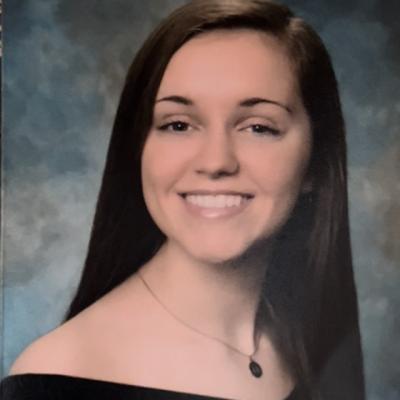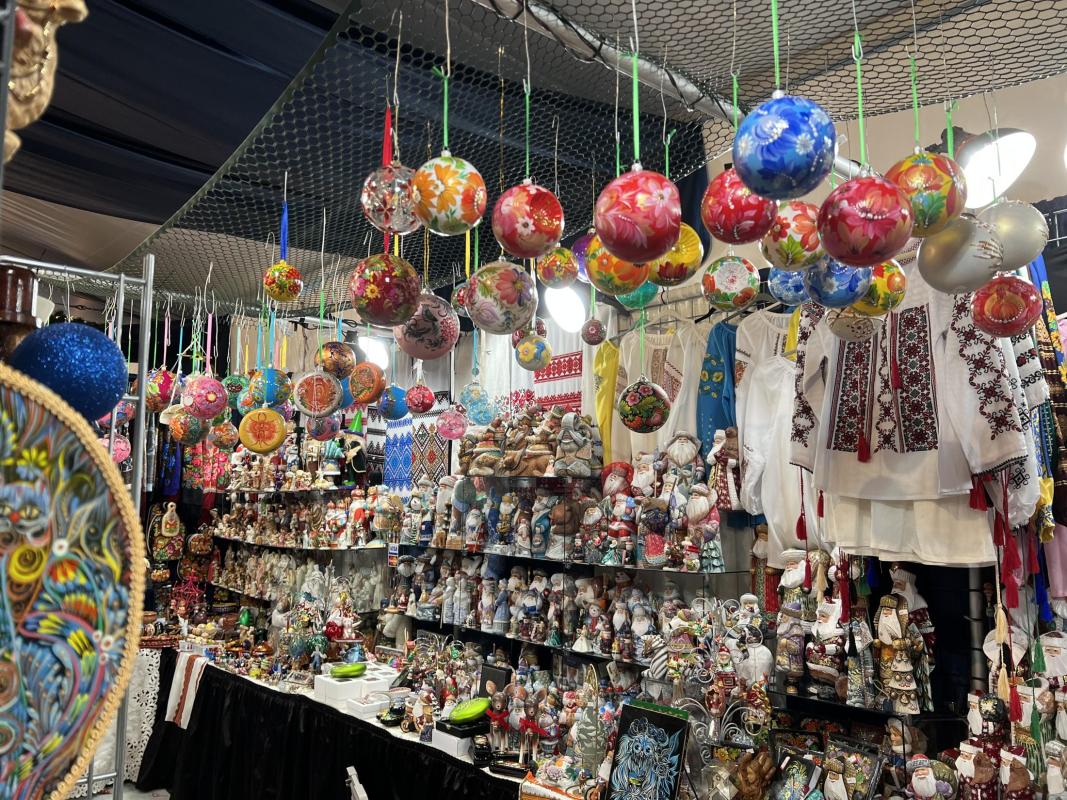
Green garland illuminated by soft, white lights hangs from the ceiling. Red ribbons and silver bells brighten every corner. Groups wander around and share smiles over soft pretzels and schnitzel. At the center of it all, a musician plays familiar acoustic melodies.
At the German Christmas Village in Baltimore’s Inner Harbor, it’s hard to resist the holiday spirit. The seasonal marketplace has visited the city for many years, bringing a variety of specialty goods sold by both local and out-of-town artisans alike.
But for one international vendor, this holiday season feels quite a bit different.
Originally from Ukraine, Myroslava Semerey and her family—who lived in Baltimore for 12 years before moving to their current home in Silver Spring—showcase handmade ornaments, carved wooden sculptures, and other authentic keepsakes at the Christmas Village each year. But their lives have taken a devastating turn since they last set up their booth.
Like so many Ukrainians, they have spent much of 2022 worrying for their family members and grieving for their country—which has lost more than 6,000 civilians and 10,000 soldiers since February’s invasion by Russian troops sparked a grueling war. According to a report released by the United Nations this month, “17.7 million people living in the country now need humanitarian assistance and 9.3 million require food and livelihood assistance.”
“My nephew was killed by a Russian sniper,” Semerey says. “We didn’t get the body yet, and we are very upset.”
Semerey’s family is not alone in their experience. Her son, Volodymyr, says that the past year has brought hardship for the entire Ukrainian community.
“Each one of our Ukrainian families were affected by the war negatively, either by losing a person or being involved in the war,” he says. “So, in this moment, the holiday spirit, we’ll try to make it as best as we can to elevate the Christmas mood, but definitely it’s harder than it used to be.”
Despite that challenge, Semerey sees selling at the Christmas Village, as well as a variety of Ukrainian festivals all over the East Coast, as a way to stay active in her community. She displays embroidered shirts, wooden souvenirs, traditional jewelry, and hand-painted Christmas ornaments from different parts of Ukraine. She also carries psanky—traditional decorative eggs that don bright colors and intricate patterns.
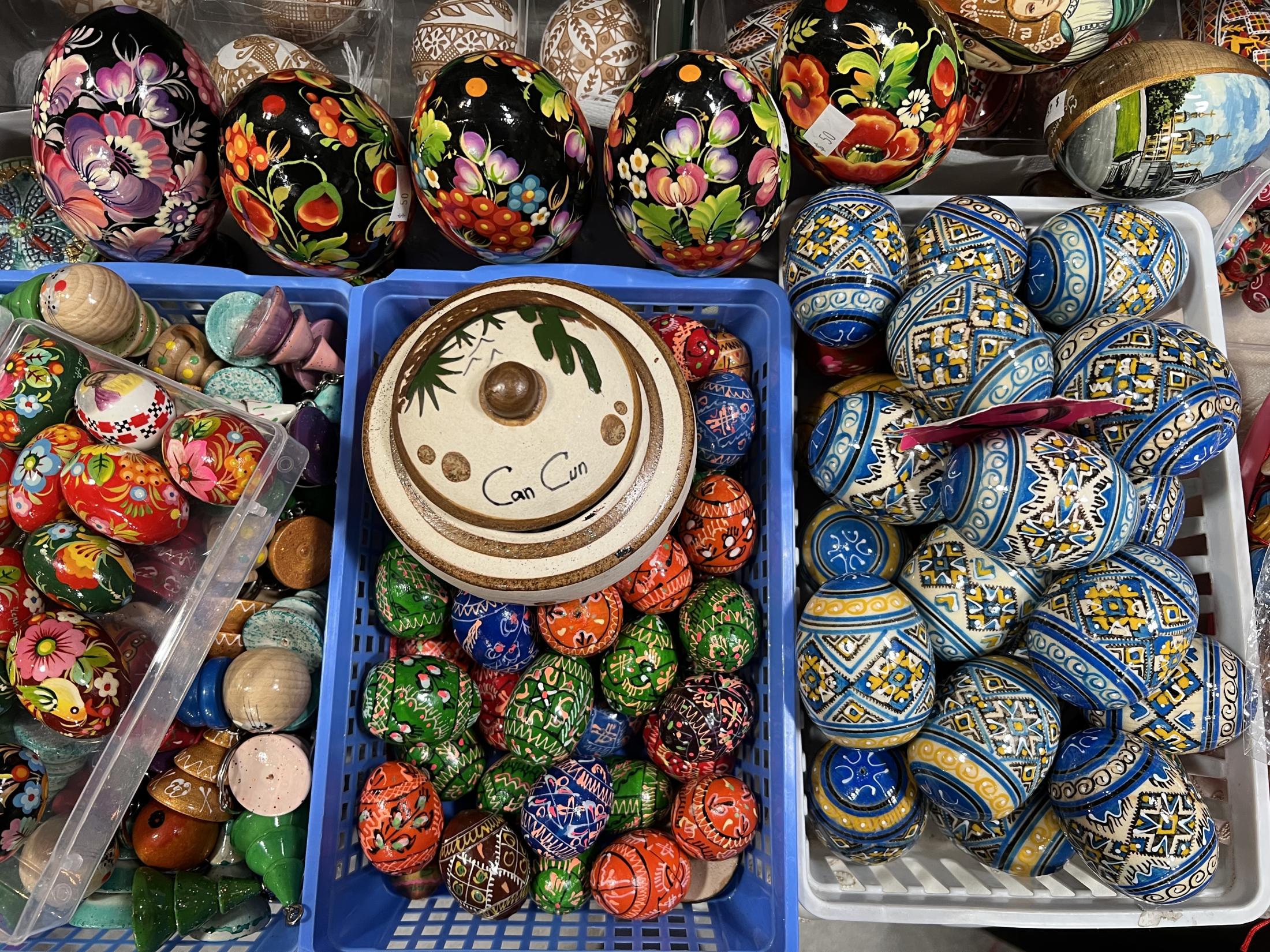
“They are a cultural symbol—the design, pattern, and even the choice of colors represent certain things,” explains Karina Mandell, chairwoman of the Baltimore-Odesa Sister City Committee (BOSCC), which facilitates a partnership between Baltimore and its Ukrainian counterpart. “Life and hope, or marriage, or a joyous occasion, or different colors and patterns can even be representative of different towns or neighborhoods.”
Mandell was born in Ukraine, and still has several family members living in different parts of the country.
Part of the Baltimore Sister Cities Program, which was established by former governor William Donald Schaefer in 1974, BOSCC’s original goal was to be a “mutually beneficial partnership,” according to Mandell, “that was part of the narrative at the time of improving international diplomacy and collegial partnerships.”
This year, BOSCC responded to the humanitarian crises in Ukraine as a result of the war. A conversation with Governor Hogan’s office led to $5 million in aid for Ukraine, which included resources like ventilators, military armor, bandages, and protective gear.
The organization also participated in fundraisers and festivals to help raise money, and sought out partnerships with other groups to send highly requested items to Ukraine. In the face of a tourniquet shortage, for example, BOSCC partnered with the Station North community makerspace Open Works, which used a 3-D printer to make more to send overseas.
“It’s definitely been a very long year,” Mandell says. “This was never the way that I expected Ukraine to be in the headlines, and I have such immense gratitude…for them fighting on behalf of the whole world, and what it represents in terms of democracy, strength, and resilience. It’s really quite symbolic.”
Mandell notes that seeing solidarity around Baltimore has been important, and she hopes that support will continue into 2023.
The Christmas Village itself hopes to offer support in its own way by maintaining its ties with Ukrainian vendors. Denis Farber, who helps to organize the market, has worked with Semerey and her booth, Myroslava’s Creations, since 2013.
He explained that for the Ukrainian businesses that sell at the Christmas Village, this year is difficult in more ways than one. Myroslava’s Creations typically sells gifts directly from Ukraine, and while the mission to support Ukrainian artists feels more important than ever this year, the war made it difficult for Semerey to get everything she wanted to sell.
Gifts From Afar is another Ukrainian vendor which, in previous years, has sold items at the Baltimore Christmas Village. This year, Farber says the vendor was unable to make it due to the war’s impacts, though it will still be participating at the event’s Philadelphia iteration. Farber hopes that the Christmas Village as an organization can continue to offer these vendors a place to celebrate their culture, as well as the holidays.
“Christmas is all about togetherness and joy,” he says. “They’re still raising awareness [about the war’s impact], and we [want to help any way we can.] But on the other side, [we also hope to] let them, just for a minute, forget about this horrible situation.”
At the Christmas Village, as people browse trinkets, they stop to look through Semerey’s stand. They marvel at the delicate designs on bulbs that hang from the ceiling and examine the wooden figurines’ uniquely carved faces. Barbara Rowe, a former Baltimore resident who was recently visiting the village from her current home in Omaha, Nebraska, was among the admirers.
“I love the crafts that the Ukrainian people put out there,” said Rowe, who expressed that she had been thinking of the Ukrainian people and was wishing them peace. “Just beautiful.”
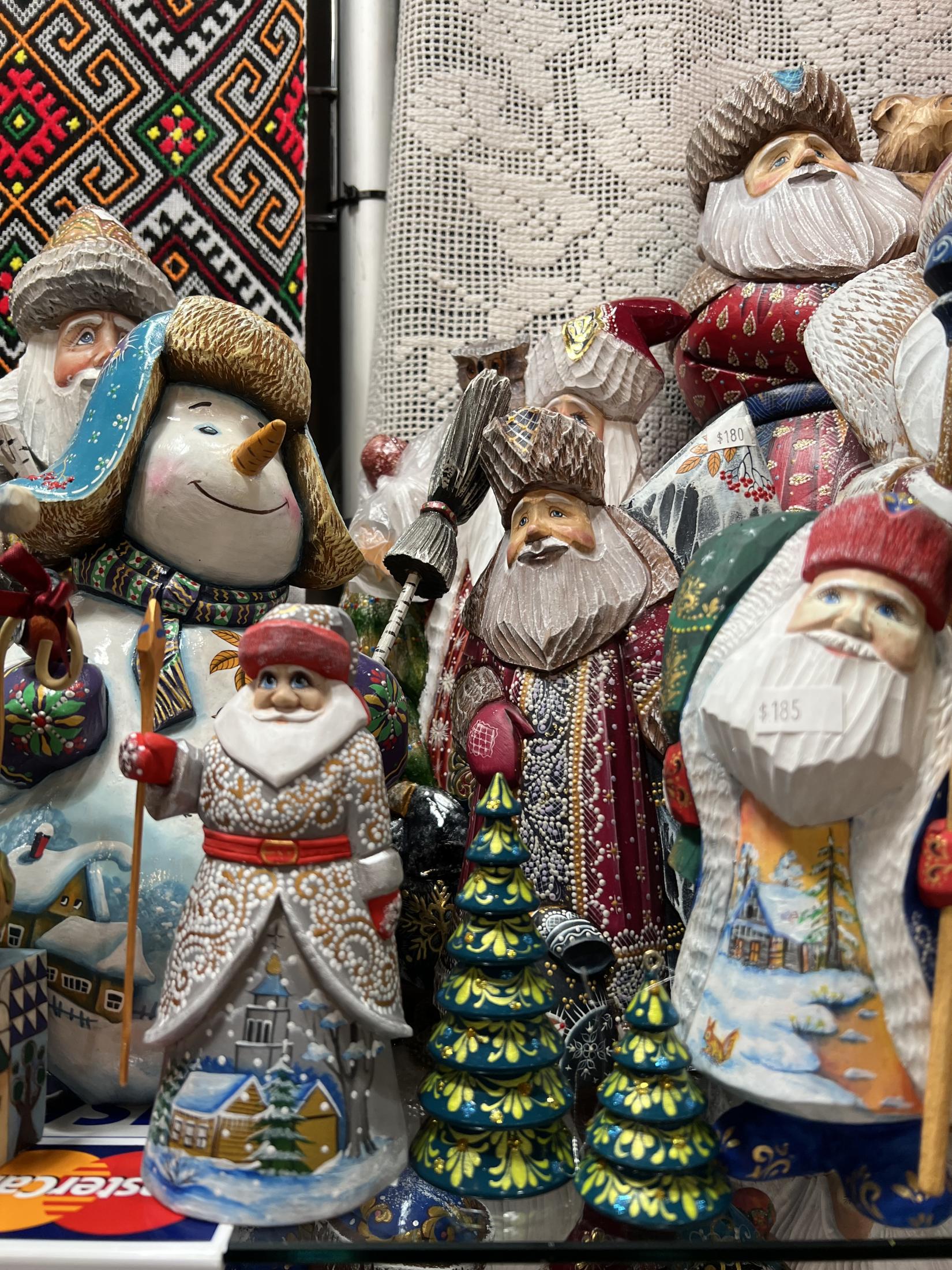
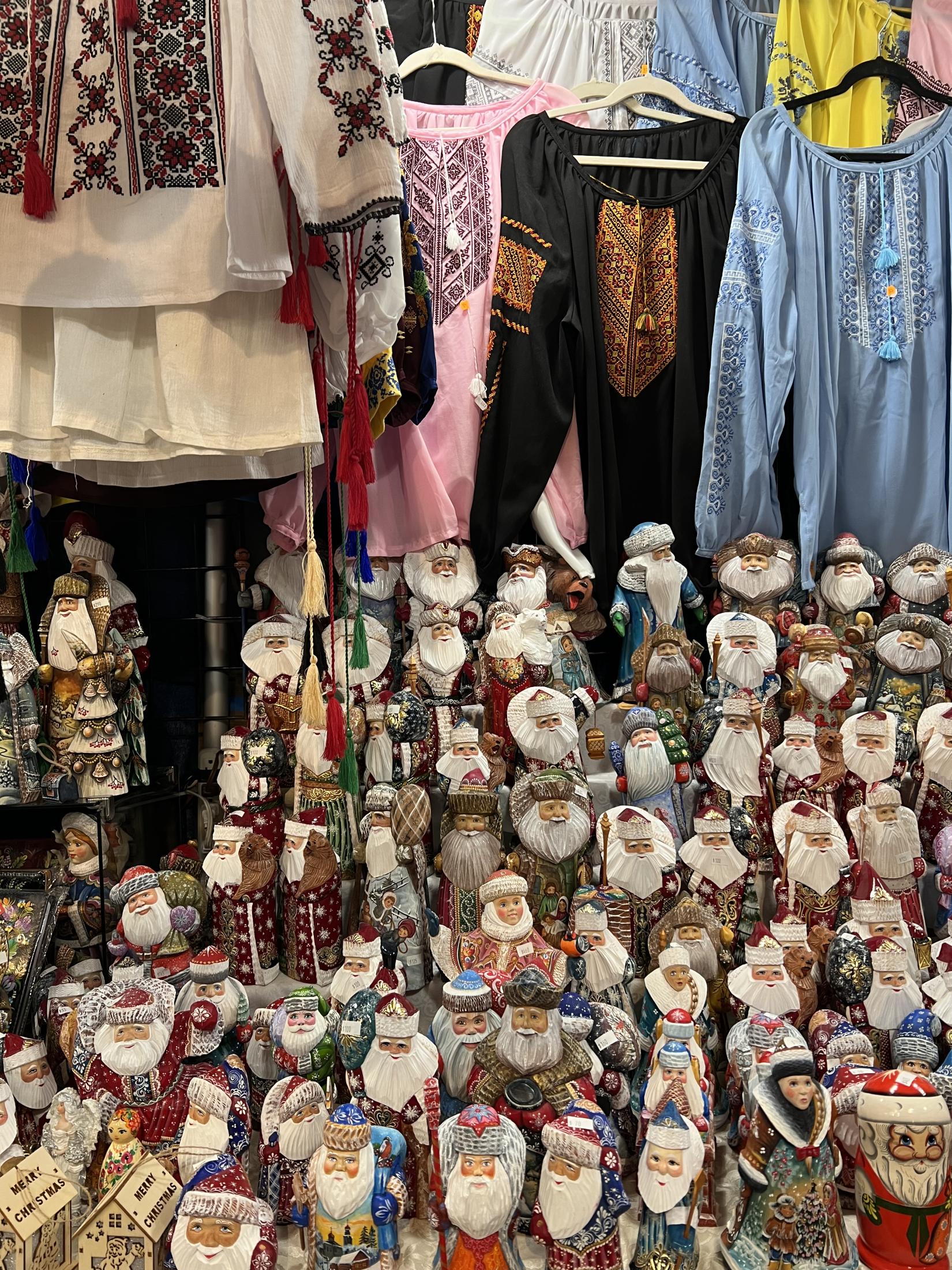
Volodymyr Semerey echoes that sentiment, saying that his wish for his community in the coming year is happiness, and maybe more smiles on people’s faces.
“It’s going to take a while to recover,” he says, “but we’ll take it day by day, knowing our culture and knowing that we are free people. It’s very hard to break us.”
